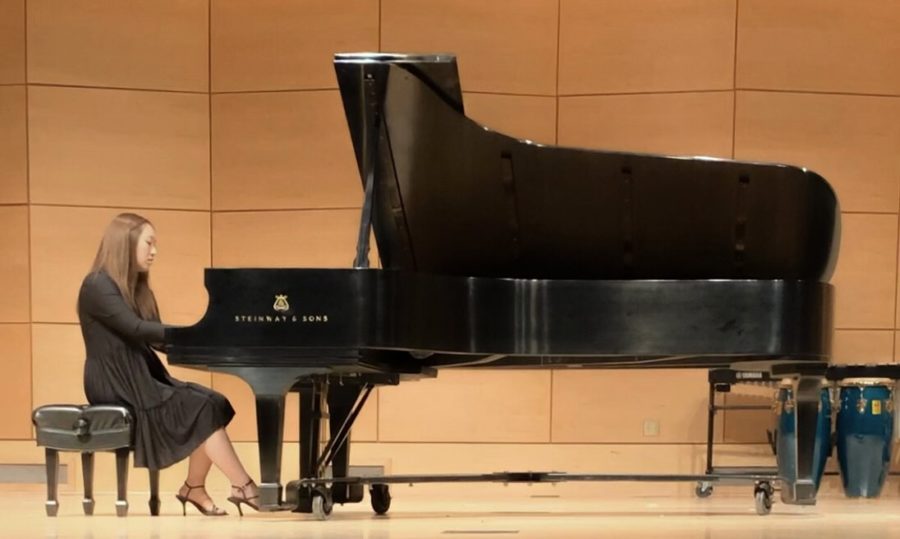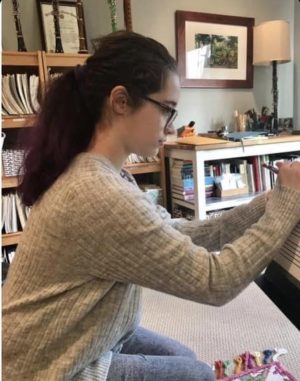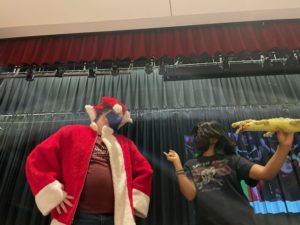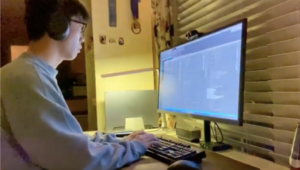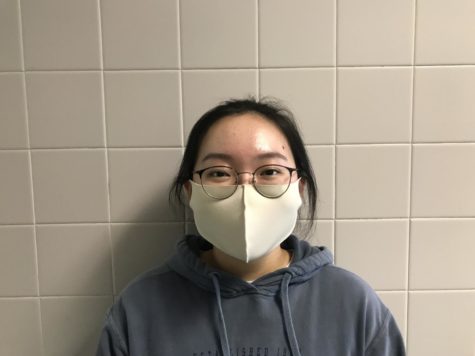Student spotlight: Oh plays piano, masters skills in successful career
In the Davis Hall at Radford University, senior Allison Oh performs for the “Works in Progress” concert during the Visual and Performing Arts Summer Residential Governor’s School in Virginia on July 14, 2021. Oh posted a video of her performing “L’isle Joyeuse” in this venue to her Instagram with the username @allisonpianoh on March 13, 2022.
April 11, 2022
Born with creativity, senior Allison Oh made up imaginary friends when she was 4 years old, concerning her mother. It wasn’t until a doctor recommended finding a performing or artistic hobby to release her creative energy that Oh began to learn the instrument that changed the course of her life: the grand piano.
Fast forward through 14 years of playing, and Oh has placed in numerous competitions. Her greatest personal achievements include an invitation to the Visual and Performing Arts Summer Residential Governor’s School (SRGS) in Virginia and winning first place in the 2021 Elite International Music Competition, which would’ve granted her the prize of playing in Carnegie Hall—the U.S.’s most prestigious classical music venue—if it hadn’t been canceled due to the pandemic.
“Allison has extraordinary musical talent and has demonstrated exceptional discipline and determination in her development of it,” history teacher Antonette Bowman said. “As I listened to a CD [from Allison] on my way home from work, I was privileged to enjoy a spectacularly performed Chopin piano Scherzo, along with several additional inspiring and technically difficult pieces. Many days later, I happened to take a moment to peruse the back of the CD case and was amazed to discover it was Allison who performed the impressive Chopin piece.”
In regards to her playing style, Oh feels that she is quite expressive and became more relaxed the last couple of years.
“I feel like even if somebody has really good fingers, dynamics and everything, but they’re still and not making any movements, you can’t really feel it,” Oh said. “So, I feel like expressing the music with your movements and facial expressions is equally important.”
From an outside point of view, junior Kenneth Duong has observed the exponential development of Oh’s playing style as they attended the same piano studio since middle school.
“Her playing style is pretty unique because, as a female, she creates sounds of a masculine tone,” Duong said. “She’s able to manipulate between those two. I think that’s what makes her stand out from others.”
According to Oh, most pianists have a favorite classical player and a current, active player. Her favorite classical pianist is Krystian Zimmerman for his raw and exact interpretations of classical music. Her favorite active player became Cho Seong-jin after Oh watched his first-place performance in the XVII International Chopin Piano Competition.
“Every performer has their personal preference on the style of playing and how they think it should sound,” Oh said. “It just so happens that every time [Cho] plays something, it’s exactly how I would want to play it. So every time I listen to him, it’s so satisfying.”
Throughout her successful piano career, Oh went through two slumps. The first was when Oh had to switch teachers due to certain complications with her first teacher. Oh’s second and current teacher, Silva Blazquez, got Oh motivated again by giving her good guidance and teachings. Oh’s second slump was when she was preparing college applications and auditions last year. At some point, Oh had felt that playing piano became more like work rather than something she enjoyed.
“Whenever people would tell me ‘You need to get this done,’ I didn’t really want to because I felt like I wasn’t [playing piano] for myself anymore,” Oh said. “But then I think after I kind of got over [that feeling], things got a little bit better, especially now that I’m done with auditions. I’m more willing to go to the piano and learn pieces on my own.”
Initially, after starting high school, Oh decided to pursue music in college just for the sake of doing it and because piano was the only thing she felt she knew how to do. It wasn’t until she attended the SRGS for Visual and Performing Arts last year that she realized her deep love for playing piano.
“I lived like a college student, studying music; I took music classes all day, surrounded by people who were really passionate about music,” Oh said. “I kind of felt like I really fit in there. I was really willing to go to the classes and wake up early in the morning.”
Oh plans to major in piano performance and get a bachelor’s degree at the University of Maryland. She hopes to attend graduate school for performance as well. Oh would like to be an assistant professor while getting a PhD in piano and become a professor after.
“I definitely want to continue performing and competing in college because one of the biggest things for being a professor, especially [one of] piano performance, is having performance experience,” Oh said.
Earlier this year, Oh created an Instagram account with the username @allisonpianoh after being inspired by similar accounts that other musicians at SRGS had. She uses the account to share her videos of her playing and keep up with her practice.
Beginning in 2017, Oh has also performed monthly in retirement homes, assisted living homes and Alzheimer’s care centers in Northern Virginia to use her gifts to further benefit other people.
“Once, a professor explained to me that the main purpose of music is to share it with people,” Oh said. “If you’re cooped up in the practice room all day, playing by yourself, it might give you a certain amount of satisfaction, but it doesn’t really serve its full purpose, like what music is for.”
According to PubMed Central, adolescent musicians can experience music performance anxiety, demonstrating the difficulty of balancing school, social and music-focused aspects of life.
“Honestly, I’m kind of surprised at how well she balances [her activities] because she’s able to balance school and have a social life,” Duong said. “I know it takes hours of practice to get to her level.”
Above all, Oh experiences the most joy when receiving compliments after moving her audiences as she plays piano, helping solidify her dedication to the art.
“Developing an ability that brings such joy and satisfaction is well worth the time and effort,” Bowman said. “Long-term commitment to playing an instrument also teaches invaluable lessons about discipline and the development of technical expertise. It facilitates a personal understanding of music as a transcendent means of artistic expression.”


